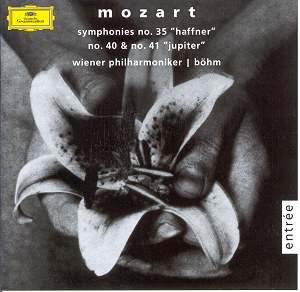Donít suppose youíre
getting typical performances of the
mid-20th century Ė for
that you can go to Böhmís recordings
from the 1940s and 1950s. Donít suppose,
either, that youíre getting classic
recordings from a conductor who, late
in life, rose to a peak of high eminence
Ė for that you can go to the versions
of these works included in his complete
Mozart cycle, recorded in Berlin during
the 1960s. For this is late Böhm,
very late Böhm.
For most of his career
Karl Böhm (1894-1981) aroused
no very great excitement but was much
in demand as an extremely reliable
practitioner of the old Kapellmeister
school. And his performances did sometimes
achieve greater inspiration than this
implies, especially in the opera house.
Then, in the 1960s, maturity seems
to have increased his insight without,
for the moment, impairing his vitality.
He became one of the worldís top conductors
and a convenient "traditionalist"
to set in contrast to the Karajan
phenomenon. But the years were taking
their toll and his tempi began to
slow down. People started to compare
him with Klemperer, which was very
convenient since all this happened
at about the time Klemperer was bowing
out. Every age needs its myth, but
the Böhm myth was never very
robust and was supplanted by the Wand
myth almost before the dust had settled
on his grave.
More than with Klemperer,
I would compare these late Mozart
performances with Giuliniís final
phase, the work of an old man who
has withdrawn to a private Mount Olympus
of his own where, seemingly unmindful
of the vital spark which caused him
to be a conductor in the first place,
he dwells upon certain eternal, if
unexciting, truths.
Some enjoyment can
still be found in the Schumannesque
majesty of this Haffner Symphonyís
first movement. It must be said, too,
that he did not lose the art of the
innocently flowing slow movement which
was maybe his most individual contribution
to Mozart interpretation. All three
slow movements here are beautifully
poised and not so very slow at all.
Unfortunately, the
three minuets seem to represent a
curious experiment in seeing how slowly
these pieces can go without actually
stopping entirely. Since the conductor
was still able to extract an extremely
graceful response from the orchestra
you may feel that he just about proves
his point, but the music has a very
gaunt air. Surely Mozart would have
provided a fuller texture if he really
wanted the music to go so slowly.
The Haffner concludes with a very
staid finale.
The first movement
of the G minor is such an extraordinarily
great piece that any performance which
tells us something we didnít know
about it is worth hearing once. The
tempo is about the same as Klempererís,
but it chugs less since Böhm
seeks grace and serenity in the music.
It can by no stretch of the imagination
be called "Molto allegro"
but its Olympian calm is impressive,
even sublime in its way. Once again
the slow movement is very beautifully
realized at a mobile tempo, but then
comes that dreadful minuet. The final
is robust here and there; elsewhere
it sounds as if the conductor was
too tired to do a proper job.
The Jupiter might
be thought to respond best to this
treatment and the opening movement
has considerable majesty. The slow
movement is once again very fine (and
not slow) with some impressive pointing
of the darker harmonic undercurrents.
Yet another woefully slow minuet.
The finale invests the final fugal
denouement with almost Brucknerian
splendour but itís been a weary slog
along the way.
Incidentally, Böhm
is pretty meagre over repeats. Normally
Iíd be critical but in this context
I thank the Lord for small mercies.
I find it reprehensible,
indeed irresponsible, that these performances
should appear on what is obviously
intended as a cheap, popular label.
This disc should only be heard by
those with the knowledge and experience
to glean what is good from it and
set aside the rest. Personally, when
I have other performances for comparison,
I shall be pleased to take out these
slow movements, and in certain moods
I may enjoy the first movement of
the G minor. I donít much care if
I never hear the minuets and finales
again. If this disc was anybodyís
introduction to classical music, it
might also be his farewell. DG are
really doing themselves no favour
by issuing a CD which could be prejudicial
to future sales of classical music
in general and, more specifically,
to the more marketable areas of Karl
Böhmís extensive discography.
Christopher
Howell


